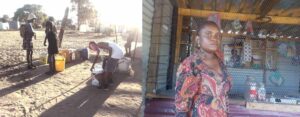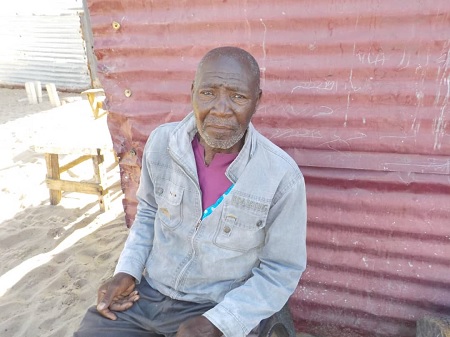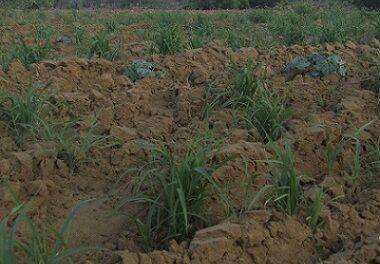By Elina-Ombili Shishaki /
Eenhana is the administrative town of the Ohangwena Region, a region so vast that it stretches hundreds of kilometres from the settlements of Endola and Ongenga in the west to the upcoming town of Okongo in the east.
Proclaimed a town in July 1999, Eenhana has over the last two-and-half decades grown rapidly in infrastructure development and in population.
Known for its moniker “the green side” due to its naturally green environments, Eenhana is home to more than 7000 people.
Before the proclamation of Eenhana as a local authority, most of these people had been residents of villages near and far all over Ohangwena Region, as well as villages in the southern parts of Angola’s Cunene Province.
All of them looking for a better life, they settled in Eenhana.
But there are those who are yet to find the better life which attracted them to Eenhana. These are the people who have found a place to call home in the sprawling shantytowns of Eenhana.
Ombili is the biggest of the two informal settlements of Eenhana. Located a stone’s throw distance away from the town, Ombili, also known by its residents as Opalasa, is as old as the town of Eenhana itself.
The informal settlement is home to many people, and the entire location is covered with corrugated iron shack houses, with no electricity, no flushing toilets and constant water shortages.
To pave way for development, the town council is busy with the relocation of Ombili residents to Ekolola, an area further in the north and far away from town. It is at Ekolola where the town authorities have demarcated erven for those who are moving from Ombili.
During a visit at Ombili informal settlement Omutumwa stopped by Ms Oshondili Shigwedha, a 33-year-old mother of three children who narrated her day-to-day struggles to make ends meet.
“I have been staying here for over 15 years now,” Shigwedha said. “I stay with six occupants in my three-bedroom house, with no water or electricity or a toilet. To feed my family I sell fat cakes and fried fish.”
Mr Sam Lukas, a 62-year-old former builder who hailed from Etomba village, is also a resident of Ombili. He has been living in his two-bedroom shack house for 10 years. Lukas lives with his wife, daughter in-law and two grandchildren who all are dependent on him.
“I used to work at a construction company as a builder on temporary bases; I never got a permanent job that would help me sustain my life,” Lukas said.
“Unlike other pensioners I am yet to receive my monthly pensioner’s grant which I believe will lessen my responsibilities towards my family since they are all depending on the income I earn when I do odd jobs here and there.”
Lukas further added that he struggles on a daily basis to provide for his family with no monthly income.
“Since there is no water at my place we buy water daily at a cost of N$2.50 per 20 litre container. There is no proper toilet, we relieve behind bushes when nature calls.”
While the town council has promised to provide a permanent plot at Ekolola for everyone, Lukas expressed concern about these plans of relocating the entire settlement, saying that it will be costly for him to erect a new shack at a new location since his current shack house is worn out.
“I would be grateful though if the council meet us half way and lend a helping hand in terms of transportation,” he stated.
For 34 years old Hendrina Kapunda, life was worthwhile when she moved to Eenhana ten years ago. Born at Opepele village in Oshikunde Constituency, she left the village after securing a job as a bar tender.
“My life took a dive when I lost my job a couple of years ago which landed me in such a dire situation,” she said.
“Finding a job nowadays is not easy. With no monthly income I still have to buy water and cover household expenses with the money I earn by doing odd jobs.”
She added that one serious challenge they live with in Ombili is the availability of water for household consumption, as at times the taps run dry since residents constantly flock to line up with their containers to fetch water at a communal tap.
Speaking to Omutumwa, another resident of Ombili location, Ms Anastasia Tomas said that crime has increased in recent years, and the absence of street lamps has made the situation worse.
“It is risky to walk from town to our homes after sunset. Since there is no electricity in the whole area, we live in fear for our lives when it becomes dark at nightfall because so many people fall prey to criminals,” said Tomas.
Tomas hailed from Otaukondjele, a village situated in Eenhana Constituency. She lives with seven other household members of which five are her children who are schooling at local schools.
To better her life and break off the shackles of poverty and unemployment Tomas opened a tuck-shop at her three-bedroom shack house to put bread on the table.
In an interview with Omutumwa, Eenhana Town Council Acting Chief Executive Officer (CEO) and Senior Manager for Economic Development, Environment and Community Services, Mr Gabriel Mwaninga, said that the council is well aware of the difficult situation faced by the town’s shack dwellers.
But, he said, the town is also faced with numerous challenges such as inadequate infrastructure, inadequate housing, no land tenure security, limited government support and drought.
He also pointed out that the council is busy servicing the Oukango location, an informal settlement situated in the west side of Eenhana town in partnership with Development Workshop Namibia.
The project is at an advanced stage where 304 erven are being serviced.
“Ombili location is within an Erf that is earmarked for [the construction of] NUST Campus, which is why residents of this area are being relocated to a new location,” Mwaninga said.
Mwaninga also stated that in order to promote good sanitation, the Ministry of Agriculture, Water and Land Reform allocated N$1.5 million to the council for the current financial year.
“As part of the relocation package the council will provide water (communal taps) at the new location that will be within 100 metre radius of walkable distance. Close to 200 pit-latrine toilets will be built at the new location since the number of shack dwellers increase day by day.”
To address the situation of food insecurity due to drought the council has registered close to 400 people in informal settlements to be beneficiaries of the drought relief programme.
In an effort to curb crime in informal settlements, Mwaninga stated that, “the council will install streetlights in most affected areas.”
To address the challenge of access to better housing faced by shack dwellers the council has allocated unserviced land to the Shack Dwellers Federation to construct low cost houses.
“The council has also allocated 100 erven to the National Housing Enterprise (NHE) that side of Ombili location.”

In the photos: Mr Sam Lukas was pictured at his two-bedroom corrugated iron shack house; in another image, residents are fetching water at a communal tap in Ombili informal settlement, while Ms Anastasia Tomas is seen at her tuck-shop.

[NB. This article was produced with the financial support of the European Union. Its contents are the sole responsibility of Omutumwa and do not necessarily reflect the views of the European Union.]







